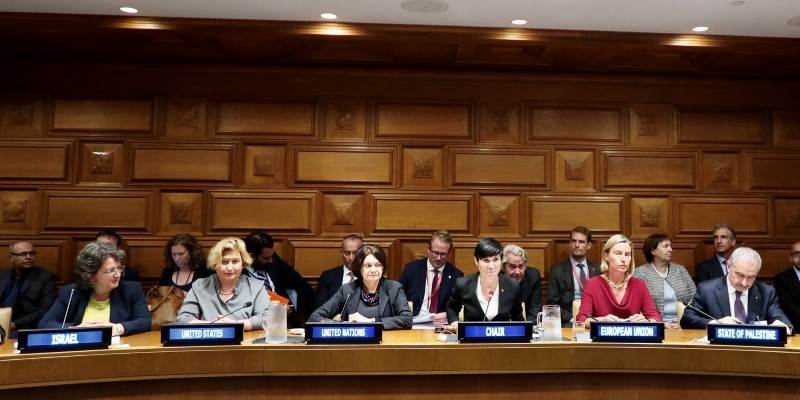Colleagues,
We meet at an uncertain and unpredictable time. The Palestinians have been exposed to increased political pressure and severe fiscal challenges. Regional instability is having a negative effecton the security situation for both Israelis and Palestinians. These negative developments could have resulted in a crisis.
At the last AHLC meeting – in Brussels at the end of April – we were worried that collapse of the PA could be imminent. One year ago, when we met here in New York, we were afraid the situation was descending into a downward spiral that could easilylead to a new war in Gaza.
Today, we see that our measures over the past year have had a positive impact. The worstscenarios have been prevented. We have witnessed new and creative initiatives from the parties themselves, negotiated in bilateral contacts.
The recent arrangement on blue tax, which has allowed for a significant financial transfer to the PA, is only temporary. But it is an indication of the willingness and ability of both parties to take action in a positive direction when crisis is looming. This arrangement will allow the PA to continue to function into next year.
We are also seeing good effects of our humanitarian package in Gaza. The implementation of projects in Gaza has taken place in close cooperation with the PA. Decisive contributions have been made by Egypt, the UN, Qatar and others. Donors have experienced good cooperation with COGAT.
I commend both parties for continuing their security cooperation and joint efforts to find ways forward.
Yet, the conflict remains unresolved. The occupation persists. There is no credible political process towards peace and a lasting settlement. The danger of a humanitarian crisis or even war in Gaza has not passed.
This year, Israel has held two elections. It will still be some time before we know the composition of the new coalition government and its policy. Still, I will take this opportunity to urge the new government to avoid any unilateral moves that will impede or put at risk the resumption of a political process and viable conditions for a two-state solution. Calls for annexing large areas of the West Bank worry me. The international community has consistently declared unilateral annexations to be unlawful and unacceptable.
Furthermore, it worries me when I see the use of violence increasing. All states have the right to defend themselves. But civilians have the right to security and must never be a target.
While we work for the resumption of talks, we should do more to ensure that the institutional foundation for a future Palestinian state is maintained. The successful establishment of the PA must be consolidated, and limitations to its further development removed. I urge you to continue the efforts to build democratic institutions, and to strengthen the rule of law, equal rights and opportunities for all, and ensure a vibrant civil society.
The report by the World Bank that was prepared for this meeting shows the negative effects of the fiscal crisis related to the conflict over clearance revenues onthe Palestinian economy. The parties should build on last month’s temporary arrangement to resolve all outstanding fiscal files for the long term, including the necessary amendments to the Paris Protocol.
The current restrictions and impediments to economic activity, the lack of agreement on key issues, and reduced donor funding are preventing the Palestinian economy from achieving its potential. These obstacles need to be removed in order to reduce aid dependency.
Trade should be facilitated between Gaza and the West Bank, between Palestine and Israel, as well in the wider region and international markets. Israel and the PA should provide proper and transparent trade statistics.
Colleagues,
Implementing projects in Gaza is not enough. Gaza needs to be opened up. As implementation capacity has improved, there is now capacity to absorb higher levels of donor funding for high priority projects. We must stick to our goal of enabling the PA to return to Gaza.
Colleagues,
The Ad-Hoc Liaison Committee was established in the aftermath of the Oslo agreements to underpin the vision of a two-state solution to the Israeli-Palestinian conflict. The current lack of political progress must not make us lose sight of what we have achieved, or our target. A negotiated two-state solution remains the only viable alternative for a lasting political settlement.
Thank you.
